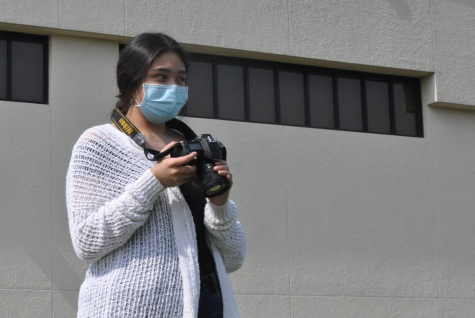Pursuing passion
New district policy helps level GPA playing field
Balancing Act: Senior Fatima Malik works on several assignments at once. Students struggle with taking both high-level classes and electives and the new GPA system aims to fix the imbalance. “I think [the new GPA policy] is a good and bad thing,” senior Teena James said. “But it’ll let kids have more time to find what they want to do.”
The district’s new policy for the graduating class of 2023 will calculate GPA based only on math, science, social studies and English classes. This completely separates the core class GPA and ranking system from electives. Currently, electives are weighted differently based on the class or difficulty level. However, high-achieving students tend to steer clear of 4.0 electives as a whole, even if the course appeals to them. As college application deadlines approach, admissions officers look for activities that make a student stand out: a unique special interest or a talent fostered over the years. Taking classes just to boost GPA without interest or motivation in the class is not only counterintuitive, but can be detrimental to students’ college careers. The new policy is beneficial to the student body by fostering interests from a younger age.
Students thrive when they are interested in what they’re doing while performance tends to suffer when there is little interest. According to a 2015 study of about 600 students in both private and public schools, the majority of students felt a “moderate to great deal” of stress from their daily workload in college-level or advanced classes. Taking advanced placement classes without any intention of truly learning or absorbing the material only increases stress levels and can have an adverse effect on educational performance.
In addition to the academic disadvantages, students may face deteriorating mental health due to overwhelming classwork in a class they loathe. Intrigue in a subject effectively motivates students to do well, but detachment from classes builds a barrier between students and their true passions. This, in addition to school-related stress, wreaks havoc on physical and mental health. Without outlets to allow students to express their interests, a school is more like a prison than a center for growth.
High school students should be able to explore their talents and discover a possible passion through taking elective classes. In the frantic race to a perfect GPA, students ignore the opportunity that electives present. Elective classes like engineering and culinary can lead to legitimate, prospective careers. The activities in the classes serve as a “trial run” for students who want to explore their interests. All students should have an equal opportunity to find their passion or hobby, but potential fades away when talent is left unnurtured.
Some students argue that the new policy is unfair because the amount of effort put into certain elective classes warrants grading it on a scale equal to core classes. Classes like Academic Decathlon are graded on an AP scale of 5.0 and are known for a large workload in and out of class. However, a GPA system accounting for grades in core classes without considering electives creates a more level playing field. The new policy ensures students aren’t discriminated against based on their personal interests and endeavors.
Though it is difficult to get out of the 5.0 mindset, students must step outside of the high school bubble and think in the long run. Electives help students branch out in their educational careers before being forced into the adult world. Additionally, taking elective classes regardless of scale helps introduce new interests to students. District policy eliminating electives from GPA offers equal representation for students and encourages them to pursue their true passions.



![Balancing Act: Senior Fatima Malik works on several assignments at once. Students struggle with taking both high-level classes and electives and the new GPA system aims to fix the imbalance. "I think [the new GPA policy] is a good and bad thing," senior Teena James said. "But it'll let kids have more time to find what they want to do."](https://www.peshprints.com/wp-content/uploads/2019/11/pursuing-passion-900x598.jpg)








